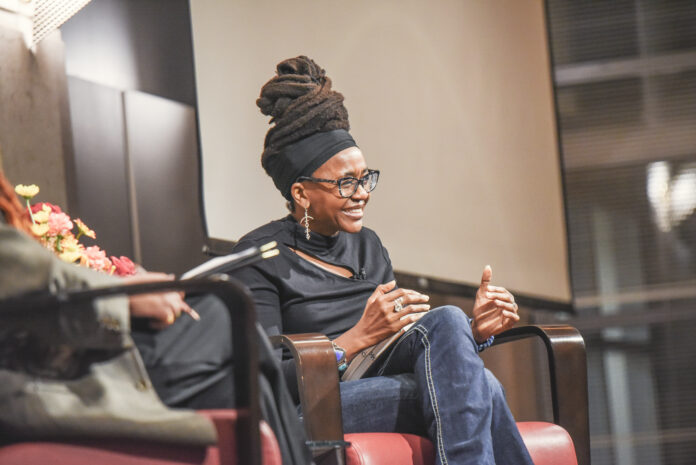
On Nov. 7, award winning author Nnedi Okorafor came to Muhlenberg as a part of the Living Writers series. Okorafor is the winner of Hugo, Nebula, World Fantasy, Locus and Lodestar Awards and has written comics for Marvel, including “Black Panther: Long Live the King” and “Wakanda Forever.”
The class read Okorafor’s “Noor” (2021), and in collaboration with the Center of Ethics, her novel, “Binti” (2015), was selected as this year’s Common Read. Okorafor is a Nigerian-American author of African-based fantasy, science fiction, and magical realism. She coined the term “Africanfuturism,” which she explains is “concerned with visions of the future, is interested in technology, leaves the earth, skews optimistic, is centered on and predominantly written by people of African descent (Black people) and it is rooted first and foremost in Africa. It’s less concerned with ‘what could have been’ and more concerned with ‘what is and can/will be.’”
When Okorafor came to campus, she had lunch with a handful of students, a rare opportunity for students within the Living Writers course. Associate Professor of English Linda Miller explained, “When we first started teaching this class, we realized right away that there are some students who wanted to have a more hands on experience or conversation with the writers, and really talk to the writer about their professional career as a writer and ask questions that don’t really come up in the Q&A, because we’re focused so much on the text.” During the lunch Okorafor spoke on her experience getting her first book published, what it’s like writing for Marvel and her writing process.
“Take the time to own your craft, find your voice and be secure of yourself.”
– Nnedi Okorafor
When asked about publishing one’s own book, Okorafor advised students to “find your own path. There is no one way of doing it.” She continued, “don’t try to enter the publishing industry when you’re not ready. Take the time to own your craft, find your voice and be secure of yourself.”
Okorafor talked about how when she was writing her first novel, “Zahrah the Windseeker,” she struggled to find anyone to publish it because at the time, no one was writing novels set in a futuristic world that was based on Nigerian culture, while also featuring elements of fantasy. Okorafor explained, “at that time, it was just unheard of. So for multiple reasons, the fact that I was a Black woman, Nigerian-American woman, who was writing this kind of thing, I kept hearing, ‘Oh, we’ve never seen this before. And therefore, we don’t know if it will sell.’” Eventually, her book was published because “I had this Black agent who understood what I was writing and the difficulty of it. Then, she found a Black woman who was in a position of power, who understood what I was writing, and could reach her hand out and buy it right there.” Okorafor used her story to emphasize how this “speaks to the need for diversity” in the publishing industry.
Later that evening was an event in collaboration with the Center of Ethics, where Assistant Professor of English and Africana Studies Emanuela Kucik, Ph.D, led a conversation with Okorafor regarding both “Noor” and “Binti.” The theme of the College’s common read was “Speculative Futures.” The event, which took place in Miller Forum, was filled to the brim with students. Kucik asked Okorafor a range of questions, from the significance of names in her novels to Africanfuturism. Kucik commented, “It was an immense honor and privilege to be in conversation with Okorafor, and it was an absolutely incredible experience! She provided so much helpful context about how she created both ‘Noor’ and ‘Binti,’ and I found it particularly illuminating to hear her speak about how her personal experiences influenced so much of her writing process(es) for both novels. I also loved listening to her discuss how her characters ‘speak’ to her; it emphasized how real these characters are not only to Okorafor, but to so many people who see themselves in her work.”
“I think it’s cool to read a piece with the creator in mind.”
– Nico Correa ‘24
Many students continue to find the class to be extremely insightful and eye-opening in regards to learning one’s writing process. Harry Glicklin ‘26 expressed that “The inclusion of writers from all different genres has really helped me get a holistic view on writing, and the many outlets that people use to express their ideas.”
However, some students are still conflicted on their feelings about the class. Nico Correa ‘24 commented, “My experience in the class has been engaging. I think it’s cool to read a piece with the creator in mind. However, with regards to the variety of books being assigned, I am left a bit dissatisfied.” Correa wished that the faculty teaching the course could choose the books that the class covered, however the authors who come to visit are the ones who choose what the class reads. Kucik hopes that students were able to learn a lot from Okorafor. She “loved [Okorafor’s] emphasis on creating art as an antidote to social issues. Much of contemporary public discourse (in the social justice realm) focuses on how to combat destruction, and I loved her perspective on the topic, which is that one way to combat destruction is by endlessly creating art that embodies what you want the world to be—art that allows us to see what the world could be and that shows us how to create an entirely new, better world.”





















